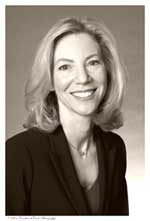College President’s Series:
President Amy Gutmann, University of Pennsylvania
By Joan Baum, Ph.D.
 In her inaugural address last October as the University of Pennsylvania’s 89th president, Dr. Amy Gutmann articulated a tripartite “vision” she believed could turn Penn from “excellence” to “eminence.” Called the Penn Contract, its goal is to increase access, integrate knowledge, and engage communities locally and globally. “Penn is no ivory tower institution of higher education,” the president remarks, noting that ground will soon be broken for a new Center for Advanced Medicine and for a 14-acre complex that will contain arts and cultural facilities, retail outlets and green space. The Center, alone, concentrating on cancer and cardiovascular disease will offer “patient-centered service” and draw on the university’s vast expertise in these specializations. Clearly, these additions to the university will make the university even more visible at home but particularly abroad, she feels.
In her inaugural address last October as the University of Pennsylvania’s 89th president, Dr. Amy Gutmann articulated a tripartite “vision” she believed could turn Penn from “excellence” to “eminence.” Called the Penn Contract, its goal is to increase access, integrate knowledge, and engage communities locally and globally. “Penn is no ivory tower institution of higher education,” the president remarks, noting that ground will soon be broken for a new Center for Advanced Medicine and for a 14-acre complex that will contain arts and cultural facilities, retail outlets and green space. The Center, alone, concentrating on cancer and cardiovascular disease will offer “patient-centered service” and draw on the university’s vast expertise in these specializations. Clearly, these additions to the university will make the university even more visible at home but particularly abroad, she feels.
Barely 10 months on the job, President Gutmann says that the Penn Contract has the overwhelming endorsement of all segments of the academic community, to judge from generous alumni gifts, from enrollment (Penn has become quite selective), and from outside reviews. Just recently, the university was named “top” school in a Newsweek/Kaplan survey, in the category—“happy to be there.” According to the president, the students say they are happy to have access to senior faculty in all disciplines and attend classes that are generally under 20. They also say they feel that the university involves them in leading problems and issues of the day, and they cite as well the opportunity to perform service in the surrounding community, experience that gives them a valuable extension of their education.The president notes that faculty also are happy, particularly because they are at an institution that values good teaching.
Herself a recipient of a Distinguished Teaching Award when she was at Princeton, Dr. Gutmann points out that good teaching goes with scholarship and that great teachers become models of the skills as well as motivation that go into life-long learning. She is pleased that a new directive designates funds to attract teachers who are interdisciplinarians by way of providing for dual appointments—a professorship in the arts and sciences and also in one of the professional schools, for example. The idea is to attract faculty who are “problem-solving oriented, rather than discipline oriented.” A recently revised curriculum that broadens distribution requirements also encourages students to pursue interdisciplinary courses as well as independent research. The president points out that while nationally students are moving away from the humanities, and shifting from the hard sciences to the social sciences, students at Penn move toward these areas. Many are international students, among them minority students who make up 38 percent of the undergraduate population (approximately 50 percent of Penn’s undergraduates are also women). The university remains committed to diversity, the president says, and especially to providing as much financial aid as it can to those who are accepted in a need-blind admission (approximately 40 percent of the freshman class receives on average $28,000 a year).
How not to quote Penn’s founder! In discussing collaboration, the president cites a Benjamin Franklin aphorism, “a man wrapped up in himself makes a very small bundle.” At Penn, mutual respect, knowing and working with others, is a major objective. For example, conflicts in The Middle East are addressed in a civilized manner; outside speakers come to the campus and “differences are argued in respectful ways, as opposed to the smash-mouth culture” of the mass media. A student of the humanities, President Gutmann is committed to fostering humanity by way of education, a goal she lovingly attributes to the teaching-by-example of her parents, a father who escaped the Holocaust just in time, a “dynamo” mother who was a child of the Depression. Their heritage lives, she hopes, in her accomplishments.#
